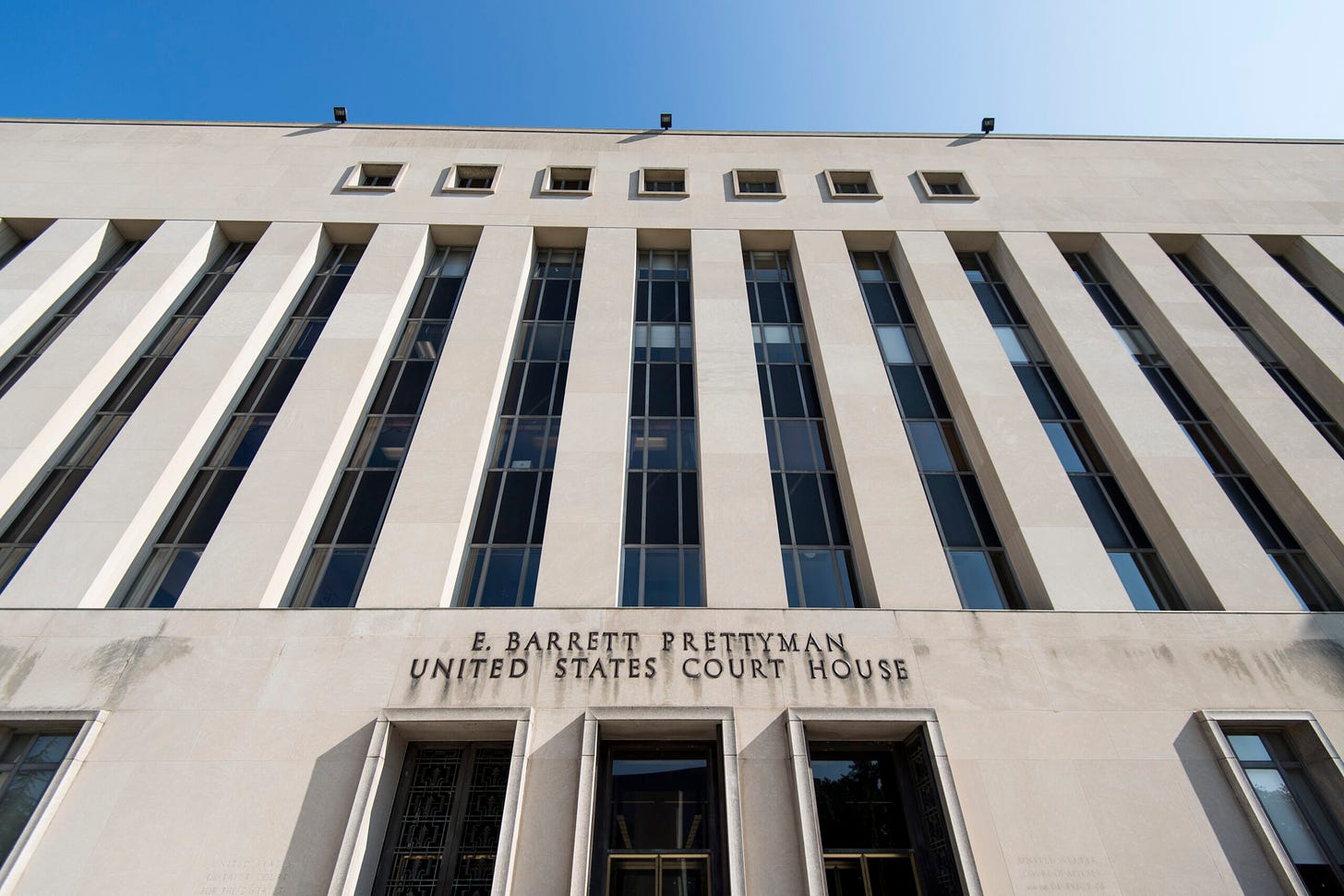
What the New Trump Contempt Motion Tells Us About the Mar-a-Lago Documents Prosecution
The charges Special Counsel Jack Smith might have in mind, and the reasons Washington, D.C. is the right venue for the case.
The Justice Department’s contempt motion against the Office of Donald Trump—being heard today in Washington, D.C. behind the closed courtroom doors of U.S. District Judge Beryl A. Howell—tells us three things, regardless of how Judge Howell rules.
First, Special Counsel Jack Smith has plainly lost patience with former President Donald Trump’s lawlessness.
Second, it’s even safer now than it was days ago to expect Smith to indict Trump. Few things motivate prosecutors more than contempt for the law and especially for grand jury investigations.
Third, it’s also safe to expect that indictment to come in Washington rather than in Florida, where Trump improperly kept government documents after he left office. They included some of the nation’s most sensitive national security secrets.
Back in May 2022, a grand jury in Washington subpoenaed the Trump office’s custodian of records to turn over all documents with classified markings.
Seven months later, no custodian has stepped up to swear under oath that all documents have been returned. Little wonder the DOJ lost patience, filing for contempt, presumably backed up by mounting daily fines against individuals, potentially including Trump himself, in order to force action.
Recall that in August, the government recovered dozens of secret and top secret national security documents and thousands of other government documents in a judicially authorized search of Trump’s Mar-a-Lago estate.
Then on December 7, the Washington Post reported that third-party lawyers whom a federal judge had pressed Trump to hire have discovered two more documents with classified markings in a Trump storage locker near Mar-a-Lago.
The FBI conducted the August Mar-a-Lago search after developing probable cause to believe that Trump lawyer Christina Bobb had previously misrepresented in a sworn statement that all government documents had been returned.
No lawyer would make that false statement unless it had come from the client. That obstructive act and others like it form the basis for potential counts of criminal obstruction of justice.
Some legal commentators have suggested that a charge of criminal obstruction of justice would have to be brought in Florida, where the obstructive acts occurred. Under the Constitution’s Sixth Amendment, all prosecutions must be tried by “an impartial jury of the State and district wherein the crime shall have been committed.”
Ample legal history establishes that a crime may be deemed to occur not only where the conduct that finally effectuates it takes place but also where the object injured by the outlawed conduct is located. Consistent with that history, Congress has said that the crime of obstructing occurs—and may be prosecuted—not only where the acts completing the obstruction took place, but also where the proceeding that the target was obstructing by concealing or destroying documents was underway.
In this case, the investigation and grand jury were proceeding in Washington, D.C., which is presumably why Smith brought his contempt motion there. The two relevant obstruction of justice statutes carry maximum terms of imprisonment after conviction of ten and twenty years.
For constitutional purposes, notwithstanding Congress’s statutory determination that the criminal trial venue for obstruction can take place where the investigation or grand jury was being hindered, the obstructive acts must have some “substantial contacts” with that jurisdiction.
No problem in this case. Communications that were central to the obstruction—for example, Trump’s lawyer’s misrepresentation—were sent to government officials in Washington.
Also, the federal government home of the documents that Trump failed to return is in the nation’s capital, which is why a Washington, D.C. grand jury is investigating. Friday’s hearing in Washington reminds us that any trial of charges of obstruction belongs there as well.
Beyond obstruction, there are numerous other crimes that Smith may allege, from conspiracy to defraud the United States of its lawful functions, to theft of government property, to false statements to a government official evidently made by Trump’s agents on his behalf.
One important possible additional charge is the willful and unlawful concealment or removal of government documents in one’s custody. That crime matters because its violation carries a consequential penalty in addition to the maximum three-year prison term: disqualification from future federal office, a penalty whose constitutionality might be challenged but one that might survive review and would at least cast a significant cloud over a convicted offender’s candidacy.
Trump’s alleged unlawful actions that ended with government documents being improperly concealed or destroyed in Florida may also be prosecuted in Washington, even if he removed them from the White House while still president and the mishandling took place in Florida. Under the general criminal trial venue statute, federal offenses “committed in more than one district may be . . . prosecuted in any district in which such offense was begun, continued, or completed.”
There is no lack of evidence that the unlawful conduct began in Washington. To cite one example, documents that Trump had in his White House residence were reportedly kept after he left office, notwithstanding legal advice to return them to the government.
Of course, Florida is also a possible venue. But the Justice Manual, which lays out DOJ’s standards and guidelines for criminal procedure, calls for prosecutors, including a special counsel, to conclude before indictment that conviction is likely. Once burned by having been put into the Florida courtroom of U.S. District Judge Aileen M. Cannon, prosecutors might do well to be twice shy about choosing to take that chance with the trial of the century.
On December 1, a U.S. Eleventh Circuit Court of Appeals panel reversed and rebuked Cannon for lawlessly appointing a special master to oversee DOJ’s review of the seized Mar-a-Lago documents, and the Trump team let the time for any appeal lapse, even though Trump remarkably insisted the next day that the seizure was illegal and the documents must all be returned to him.
So it seems likely, and entirely understandable, that Smith would opt to bring charges in Washington against Trump over the Mar-a-Lago document misconduct.
As of this writing, no signals have yet emerged from Judge Howell’s closed courtroom hearing. Still, the mere fact that the hearing is underway in Washington, D.C. foretells a future in which any Trump indictment would likely drop there.



















